The parent company of Kathmandu and Rip Curl has reported an $82.9million loss – its worst result in at least a decade – after facing a major consumer boycott last year over using a transgender athlete to promote women’s surfing.
The huge annual loss by KMD Brands included a $40.3million writedown in the value of its struggling Oboz hiking boot business and other items, but on an operational level it still made a $25million trading loss for the year to July 31.
KMD said it was once again not paying shareholders a dividend, as it has not since 2023, and was taking steps to carefully manage capital.
KMD announced earlier this month it was closing 21 stores, mostly outside Australia, out of its global portfolio of 328 company-owned Kathmandu and Rip Curl shops.
KMD’s financial woes come after Rip Curl faced a major consumer boycott in 2024 for using transgender surfer Sasha Lowerson in a promotion for women’s surfing.
Lowerson was used in the promotion after Rip Curl severed ties with pro-surfer and shark attack survivor Bethany Hamilton, reportedly over her opposition to transgender competitors in women’s sport.
‘Go woke, go broke,’ many Aussies said as they vowed to boycott the brand, with some customers even burning their Rip Curl board shorts as a result.
While the latest results are unlikely to be directly caused by the boycott, they highlight how brand the once-iconic Aussie surfing brand has lost its appeal with core customers.
The 2024/25 results are much worse than those of a year previous, when KMD Brands posted a relatively small operating loss of $970,000.

Rip Curl came under fire last year after featuring a transgender boarder in a campaign to promote women’s surfing – with many customers vowing to boycott the brand
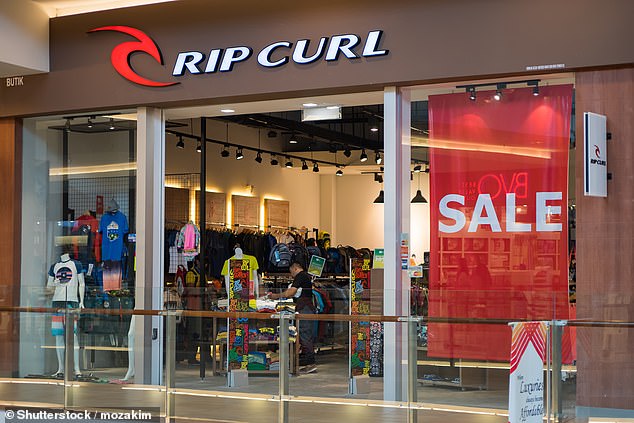
Rip Curl has been forced to close down stores

An Aussie dad has set fire to his treasured board shirts in a furious protest against Rip Curl over their use of a transgender woman to promote the iconic brand
Before that KMD Brands had been profitable since at least 2014/15, a review of its financials shows.
Sales for 2024/25 were up one per cent to $875million, but operating expenses grew 3.9 per cent to $480million.
As for its individual businesses, its Rip Curl surf lifestyle brand made $27.1million in underlying earnings before interest, tax, depreciation and amortisation (EBIDTA), down 27 per cent from last year, while its Kathmandu outdoor store chain posted a $1.15million EBITDA loss after a $13.28million profit in 2023/24.
Oboz Footwear, KMD’s US-based line of hiking boots, recorded a $2.92million EBITDA loss, from a $266,000 loss the year before.
KMD said that in a challenging trading environment, net working capital efficiency – managing its cashflows, essentially – was a key focus for the group.
As of July 31, KMD had $139.67million in net working capital, down $35.96million from a year ago.
It had a net debt position of $46.76million, with funding headroom of around $208.1million.
In a promising sign, KMD’s August sales were up 10.5 per cent above last year, with Kathmandu’s same store sales up 22 per cent year-on-year.
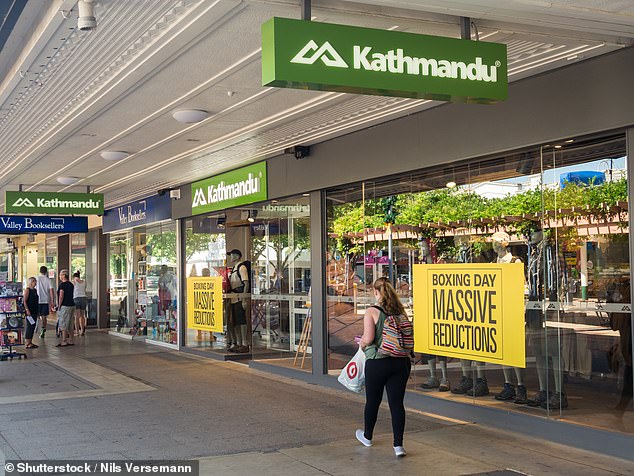
The parent company of Kathmandu and Rip Curl has posted a shock $89.2million statutory loss – its worst in at least a decade.
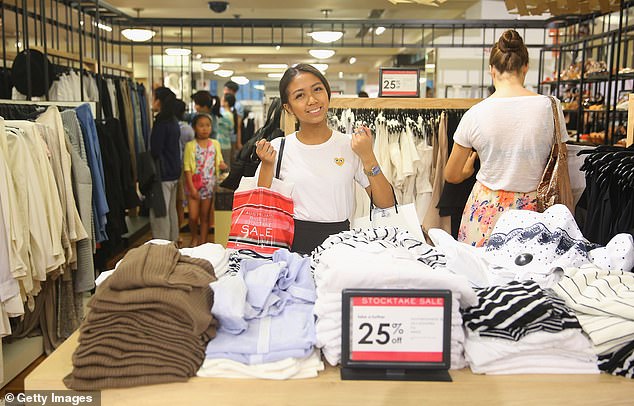
Profits for the Myer Group slumped by almost a third in the last financial year, citing tough economic conditions and declining consumer demand
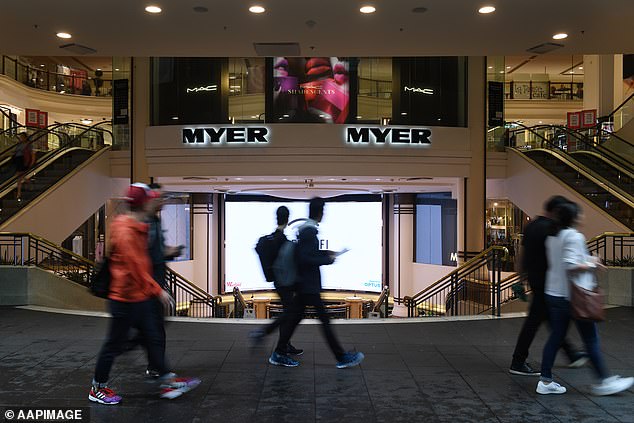
Following a profit of $43.5million last year, Myer also recorded a $211.2million statutory loss
The company’s struggles had reportedly led to interest in from retail mogul Brett Blundy in taking over the company on the cheap, with shares falling from $130 just three years ago to only 21.5cents.
The Australian reports that Blundy – who has a track record of turning around struggling clothing and apparel retailers – had approached many of the company’s larger shareholders to express interest in buying their stock.
The news came after plunging profits, store closures and a share-market bloodbath grip another iconic Australian company – Myer.
The 124-year-old chain revealed on Tuesday that its operating profit had collapsed by almost a third in the 12 months to July 26, blaming sluggish consumer spending and tough economic conditions.
Investors dumped Myer stock after the results, sending shares down 15 per cent at the open of the day’s trade, and the freefall accelerated to a 29 per cent loss by midday, trading at just $0.46.
The retailer’s operating profit after tax fell to $36.8million, down 30 per cent on the previous year, but its bottom line result was a $211.2million statutory loss as it booked a writedown in the value of the five fashion brands it bought from Premier Investments: Just Jeans, Jay Jays, Jacqui E, Portmans and Dotti.
As a result the company declared no final dividend to shareholders.
Executive chairwoman Olivia Wirth tried to steady nerves, insisting 2024-25 was a ‘transition year’ as the group bedded down its new brands and slashed $30million in costs.
‘Despite challenging macroeconomic conditions and tough retail markets in Australia and New Zealand, we achieved positive sales growth in our first period as a combined group,’ she said.
Despite company optimism that better times lay ahead, retail expert Dr Gary Mortimer warns the clock is ticking for Myer.
He said that sales for Myer’s newly acquired brands Just Jeans, Jay Jays, Jacqui E, Portmans and Dotti were either flat or declined during the second half of 2024-25.
‘It’s only year one of the acquisition, so it will be interesting to see how the next 12-24 months play out,’ Dr Mortimer told Daily Mail.
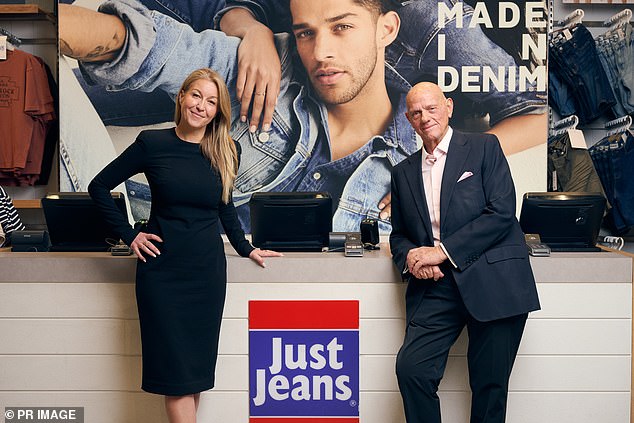
Myer executive chairwoman Olivia Wirth (pictured with Premier Investments’ Solomon Lew) described 2024-25 as a transition year for the retail giant
‘It’s been a challenging time for department stores, which have struggled in recent years.
‘It’s early days for Myer, so the next 12 months will be telling.’
Dr Mortimer warned that Myer’s fashion and homewares brands could continue to struggle due to continued inflation – particularly the burgeoning cost of housing – savaging consumer spending, pushing customers toward budget alternatives like Target and Kmart and online portals.
‘Discretionary spending is down because people are more focused on paying their rent or mortgages and getting food on the table,’ he said.
‘Brands such as Dotti are highly exposed to international fast fashion retail killers such as Shein and Temu.’
‘If they want people to spend in-store, it will require some cost-of-living relief.
‘Myer also needs a clearer value proposition on their breadth of apparel brands.’
It’s not all not doom and gloom with Myer Retail recording a 22.9 per cent jump in online sales in the financial year.
The retail giant also revealed that group sales for the first seven weeks of the 2025-26 year were 3.1 per cent up compared to the same period last year.
‘We are cautiously optimistic about the year ahead, with emerging pockets of improving consumer strength,’ Ms Wirth said.
‘We also expect to see a return on the enhancements and investments we have made to strengthen the group and offset ongoing cost of doing business headwinds.’
